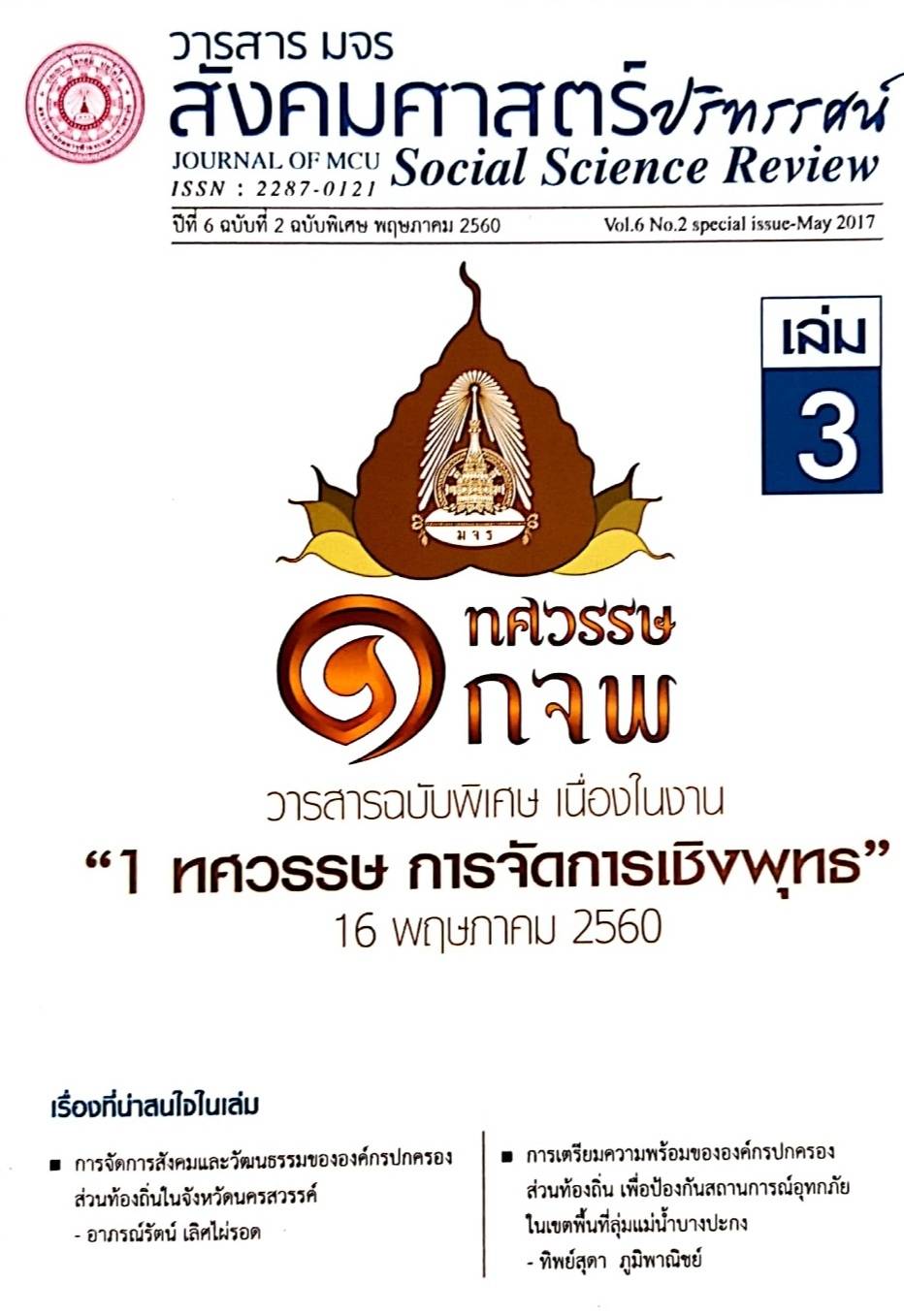แนวทางการจัดกิจกรรมสาหรับผู้สูงอายุในกรุงเทพมหานคร ตามแนวทางประเทศไทย 4.0
คำสำคัญ:
ผู้สูงอายุ ประเทศไทย4.0 สังคม สูงวัยบทคัดย่อ
การวิจัย เรื่อง "แนวทางการจัดกิจกรรมสาหรับผู้สูงอายุในกรุงเทพมหานครตามแนวทางประเทศไทย 4.0 " มีวัตถุประสงค์เพื่อศึกษาถึงประเภทกิจกรรมที่มีผลต่อระดับสุขภาพจิตของผู้สูงอายุในเขตกรุงเทพมหานครตามแนวทางประเทศไทย 4.0 เพื่อเสนอแนวทางการจัดกิจกรรมผู้สูงอายุในเขตกรุงเทพมหานครตามแนวทางประเทศไทย 4.0 และเพื่อเป็นข้อมูลสาหรับเตรียมความพร้อมรองรับสังคมผู้สูงอายุแก่หน่วยงานที่เกี่ยวข้อง โดยใช้แบบสอบถามเป็นเครื่องมือเก็บรวบรวมข้อมูลจากกลุ่มตัวอย่าง จานวน 420 คน โดยใช้สถิติพรรณนาในการประมวลผล และใช้ไคส แควร์ ในการศึกษาความสัมพันธ์ การเข้าร่วมกิจกรรมที่มีผลต่อสุขภาพจิตของผู้สูงอายุใน กรุงเทพมหานคร ผลการศึกษาพบว่า กลุ่มตัวอย่างส่วนใหญ่เป็นเพศหญิง อายุในช่วงระหว่าง 60-69 ปี สถานภาพสมรส ระดับการศึกษาอนุปริญญา-ปริญญาตรี มีรายได้เฉลี่ยต่อเดือน 3,100 – 6,000บาท มีรายได้จาก ผู้อุปการะ (ลูก/หลาน) การเข้าร่วมกิจกรรมสาหรับผู้สูงอายุ ในประเภทกิจกรรมมิติสุขภาพ มีผู้เข้าร่วมสูงสุด รองลงมา คือ มิติสังคมและมิติจิตใจ ส่วนตัวชี้วัดสุขภาพจิตผู้สูงอายุรู้สึกยินดีกับความสาเร็จของคนอื่นมาก รองลงมา คือ ให้ความช่วยเหลือแก่ผู้อื่นเมื่อมีโอกาส รู้สึกว่าตนมีคุณค่าต่อครอบครัว และมีความกระตือรือร้นในการที่จะเรียนรู้สิ่งใหม่ ๆ สาหรับผลการศึกษาความสัมพันธ์พบว่า ประเภทกิจกรรมที่ส่งผลต่อระดับสุขภาพจิตของผู้สูงอายุในเขตกรุงเทพมหานคร มี 7 ประเภทกิจกรรม ได้แก่ การออกกาลังกาย การให้ความรู้เกี่ยวกับสุขภาพการให้ความรู้ด้านโภชนาการ การให้ความรู้เกี่ยวกับหลักปรัชญาเศรษฐกิจพอเพียง การให้ความรู้เกี่ยวกับภาษาต่างประเทศ การฟังหรือปฏิบัติธรรม และกิจกรรมเกี่ยวกับดนตรี และศิลปะ ส่วนระดับความสัมพันธ์ระหว่างประเภทของกิจกรรมกับระดับสุขภาพจิต มีระดับการส่งผลแตกต่างกันโดยกิจกรรมที่มีความสัมพันธ์มากที่สุด คือ การให้ความรู้เกี่ยวกับภาษาต่างประเทศ รองลงมา คือการให้ความรู้ด้านโภชนาการ และการให้ความรู้เกี่ยวกับสุขภาพ ข้อเสนอแนะจากการศึกษาเชิงนโยบาย คือ จัดตั้งศูนย์การเรียนรู้สาหรับผู้สูงอายุในทุกหมู่บ้าน โดยอาจทาร่วมกับวัด หรือโรงเรียนตามความเหมาะสม จัดให้มีกิจกรรมการเรียนรู้หลัก ปรัชญาเศรษฐกิจพอเพียง ในเชิงการนาไปประยุกต์ใช้ในชีวิตประจาวันให้แก่ผู้สูงอายุในชุมชนต่าง ๆ จัดให้มีการฟังธรรมในทุกวันพระ ในรูปแบบของธรรมสัญจรเวียนกันไปในแต่ละวัดในแต่ละหมู่บ้าน จัดให้มีสื่อการสอนภาษาอังกฤษ หรือภาษาจีนสาหรับผู้สูงอายุ เผยแพร่ผ่านเครือข่ายโทรคมนาคม ของรัฐ และจัดให้มีกิจกรรมการเรียนรู้ที่มีผลต่อระดับสุขภาพจิตให้แก่ผู้สูงอายุ
เอกสารอ้างอิง
มูลนิธิสถาบันวิจัยและพัฒนาผู้สูงอายุไทย. (2555). รายงานประจำปีสถานการณ์ผู้สูงอายุไทย พ.ศ. 2553.พิมพ์ครั้งที่ 1. กรุงเทพฯ: บริษัท ที คิว พี จำกัด.
กรมกิจการผู้สูงอายุ. (2556), สถานการณ์และแนวโน้มผู้สูงอายุไทย พ.ศ.2556-2573 [On-line]. ได้ จาก: www.dop.go.th/main/knowledge-lists.php?id=34
สานักงานกองทุนสนับสนุนการสร้างเสริมสุขภาพ. (2560). สถานการณ์ผู้สูงอายุไทย [On-line]. ได้ จาก: http://www.thaihealth.or.th/Infographic/detail/สถานการณ์ผู้สูงอายุไทย/.
หนังสือพิมพ์ไทยโพสต์. (2560). กิจกรรม 5 ส “บ้านปันรัก” เติมความสุขให้คนสูงวัย [On-line]. ได้ จาก: www.ryta.com/s/tpd/2537512.
โยธิน ศันสนยุทธ (2530). ทฤษฎีความต้องการ.กรุงเทพฯ. สำนักพิมพ์ศูนย์ส่งเสริมวิชาการ.
ภานุ อดกลั้น. (2551). ทฤษฎีการผู้สูงอายุ วิทยาลัยบรมราชชนนี อุดรธานี.
มูลนิธิสถาบันวิจัยและพัฒนาผู้สูงอายุไทย.(2555).รายงานประจาปีสถานการณ์ผู้สูงอายุไทย พ.ศ. 2553. (พิมพ์ครั้งที่ 1).กรุงเทพฯ:บริษัท ที คิว พี จากัด.
ดาวน์โหลด
เผยแพร่แล้ว
รูปแบบการอ้างอิง
ฉบับ
ประเภทบทความ
สัญญาอนุญาต
ลิขสิทธิ์ (c) 2020 วารสาร มจร สังคมศาสตร์ปริทรรศน์

อนุญาตภายใต้เงื่อนไข Creative Commons Attribution-NonCommercial-NoDerivatives 4.0 International License.
เพื่อให้เป็นไปตามกฎหมายลิขสิทธิ์ ผู้นิพนธ์ทุกท่านต้องลงลายมือชื่อในแบบฟอร์มใบมอบลิขสิทธิ์บทความให้แก่วารสารฯ พร้อมกับบทความต้นฉบับที่ได้แก้ไขครั้งสุดท้าย นอกจากนี้ ผู้นิพนธ์ทุกท่านต้องยืนยันว่าบทความต้นฉบับที่ส่งมาตีพิมพ์นั้น ได้ส่งมาตีพิมพ์เฉพาะในวารสาร มจร สังคมศาสตร์ปริทรรศน์ เพียงแห่งเดียวเท่านั้น หากมีการใช้ภาพหรือตารางหรือเนื้อหาอื่นๆ ของผู้นิพนธ์อื่นที่ปรากฏในสิ่งตีพิมพ์อื่นมาแล้ว ผู้นิพนธ์ต้องขออนุญาตเจ้าของลิขสิทธิ์ก่อน พร้อมทั้งแสดงหนังสือที่ได้รับการยินยอมต่อบรรณาธิการ ก่อนที่บทความจะได้รับการตีพิมพ์ หากไม่เป็นไปตามข้อกำหนดเบื้องต้น ทางวารสารจะถอดบทความของท่านออกโดยไม่มีข้อยกเว้นใดๆ ทั้งสิ้น





